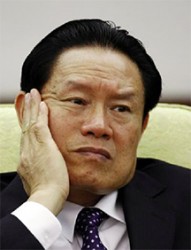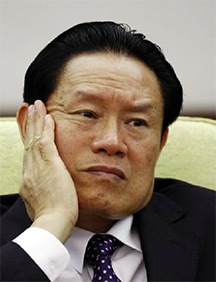BEIJING, Reuters) – Chinese authorities have seized assets worth at least 90 billion yuan ($14.5 billion) from family members and associates of retired domestic security tsar Zhou Yongkang, who is at the centre of China’s biggest corruption scandal in more than six decades, two sources said.

More than 300 of Zhou’s relatives, political allies, proteges and staff have also been taken into custody or questioned in the past four months, the sources, who have been briefed on the investigation, told Reuters.
The sheer size of the asset seizures and the scale of the investigations into the people around Zhou – both unreported until now – make the corruption probe unprecedented in modern China and would appear to show that President Xi Jinping is tackling graft at the highest levels.
But it may also be driven partly by political payback after Zhou angered leaders such as Xi by opposing the ouster of former high-flying politician Bo Xilai, who was jailed for life in September for corruption and abuse of power.
Zhou, 71, has been under virtual house arrest since authorities began formally investigating him late last year. He is the most senior Chinese politician to be ensnared in a corruption investigation since the Communist Party swept to power in 1949.
“It’s the ugliest in the history of the New China,” said one of the sources, who has ties to the leadership, requesting anonymity to avoid repercussions for speaking to the foreign media about elite politics.
The government has yet to make any official statement about Zhou or the case against him and it has not been possible to contact Zhou, his family, associates or staff for comment. It is not clear if any of them have lawyers.
The party’s anti-corruption watchdog and the prosecutor’s office did not respond to requests for comment. In the secretive world of China’s Communist Party, targets of its investigations usually disappear, often for months or even years, until an official announcement is made.
Xi ordered a task force formed in late November or early December to look into accusations against Zhou, sources have previously told Reuters. They have not said what the allegations were except that they were related to violating party discipline, official jargon for corruption.
A third source with ties to the leadership said Zhou had refused to cooperate with investigators, insisting he was the victim of a power struggle.
“Zhou Yongkang is tough and claims it’s political persecution,” the source said.
Zhou rose through the ranks of China’s oil and gas sector before joining the elite Politburo Standing Committee in 2007, where as domestic security chief his budget exceeded defence spending. He retired in 2012 and was last seen at an alumni event at the China University of Petroleum on Oct. 1.
Bonds, villas, cars, liquor, gold
The first two sources said prosecutors and the party’s anti-corruption watchdog had frozen bank accounts with deposits totaling 37 billion yuan and seized domestic and overseas bonds and stocks with a combined value of 51 billion yuan after raiding homes in Beijing, Shanghai and five provinces.
Investigators had also confiscated about 300 apartments and villas worth around 1.7 billion yuan, antiques and contemporary paintings with a market value of 1 billion yuan and more than 60 vehicles, the sources added. Other items seized included expensive liquor, gold, silver and cash in local and foreign currencies.
The seized assets belonged to those in custody, the sources said, without saying how many people in total had been detained compared to just questioned. Most of the assets were not in Zhou’s name, they added.

